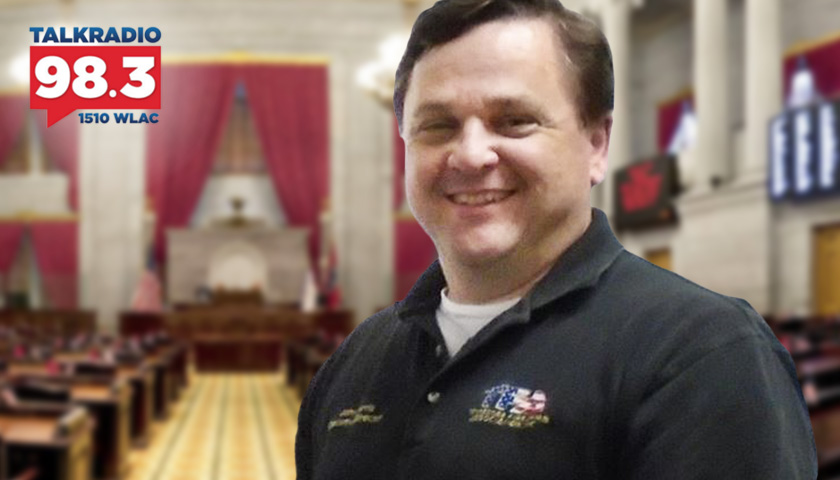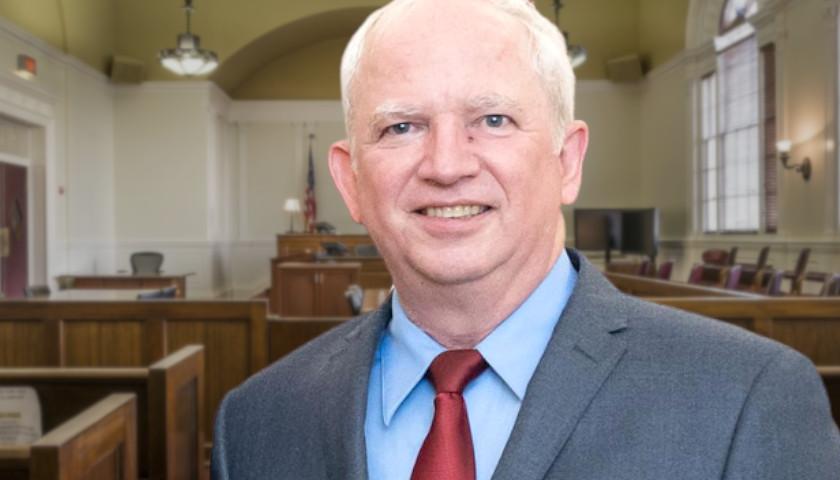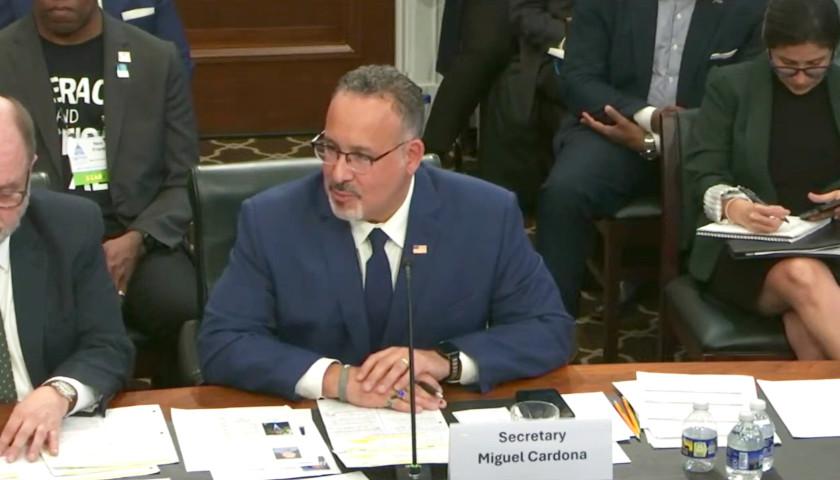Live from Music Row, Friday morning on The Tennessee Star Report with Michael Patrick Leahy – broadcast on Nashville’s Talk Radio 98.3 and 1510 WLAC weekdays from 5:00 a.m. to 8:00 a.m. – host Leahy welcomed Tennessee Firearms Association CEO, attorney John Harris in studio to explain the Brewing decision and offer suggestions as to how the Tennessee General Assembly can protect the Second Amendment.
Leahy: In studio our very good friend, the founder, and CEO of the Tennessee Firearms Association, dedicated to protecting the Second Amendment here in the state of Tennessee, John Harris.
John, the Tennessee General Assembly will convene next week. What suggestions do you have for them in terms of protecting the Second Amendment?
Harris: Read the Brewing decision. Just read the Brewing decision. (Laughs)
Leahy: Explain to our listeners what the Brewing decision is and which court made that decision.
Harris: The United States Supreme Court decided a case called New York State Rifle and Pistol Association versus Brewing back in June of 2022. It’s the third in three major US. Supreme Court decisions on the Second Amendment since 2008. But it’s probably the one that’s going to have the most immediate impact, particularly at the state level.
And what Justice Thomas said in Brewing is that he reaffirmed from the 2008 decisions in Heller that the Second Amendment, doesn’t create, but it protects an individual’s right to keep and bear arms. It protects that right in the home and outside the home, and it protects that right and is enforceable against the states to restain state discretion over passing laws like Tennessee has.
And what was really a game changer in Brewing is in the last 14 years, the federal courts, the state courts, have sort of developed this two-part analysis that was trying to weigh in the balance the state’s interest in regulating, for example, the ability of people in Tennessee to carry in public parks. We’ve got a statute that prohibits that.
And the courts had been doing this balancing analysis to say, is there a reasonable public interest in regulating where people can carry firearms or who can carry or where they can carry?
The game changer coming out of Brewing is where Thomas says in Brewing that the Second Amendment was clear and contains a mandate that the government can’t regulate. And if we evaluate a case and it concerns that issue, we have to look at what the laws were nationally in 1791 when it was adopted.
Leahy: When the Second Amendment was ratified.
Harris: Correct. If at that time the nation did not have a history of a similar type of law, for example, prohibiting caring by individuals in public parks, then the Second Amendment would prohibit that kind of law from occurring today.
And that’s the big game changer that Brewing brings about. Across the nation there’s a flood of litigation right now with courts even in New York, striking down in wholesale fashion state laws and state restrictions.
Leahy: They’re, they’re absolutely insane in the state of New York. Let’s be honest.
Harris: They are. But sadly, we say that and we mean it, and it’s true and in some respects, it’s almost a joke. But when they were deciding the Brewing case and the justices asked the attorneys representing the state of New York, can you give us other states that have similarly harsh laws? The first one out of their mouth was Tennessee.
Leahy: Interesting. I did not know that. Do you have particular legislation that you are promoting or that members of the Tennessee General Assembly will be pushing in this session?
Harris: Yes, three bills have been filed so far. None of them are going to go anywhere. Two of them are filed by Democrat London Lamar out of Memphis, and the others are filed by Republican Senator Becky Massey. But none of those three is going anywhere.
What we’re looking at from TFA’s perspective for 2023 is we’ve been trying for 28 years to convince the General Assembly that the Second Amendment is a constitutionally protected right. And it means if you can lawfully possess a firearm, you should be able to carry it.
No permit, no restriction, and no potential criminal consequences, just like carrying a pocket knife. By and large, they’re not there. They haven’t been there. Bill Lee never supported that. Neither of our speakers has really publicly supported that, or we would have it by now.
Leahy: Speaker Cam Sexton of the House and then the State Senate Speaker and Lieutenant Governor Randy McNally.
Harris: Correct. The bills have been filed in the last few years, but they shuffled them off and killed them in subcommittees. We’re going to see those bills reintroduced. The question is going to be, is there going to be an uprising momentum in the General Assembly to now actually pass real constitutional carry?
The other thing that we’re going to see, I think a lot of bills filed and hopefully, some progress made is eliminating these gun-free zones. Because one of the issues that came up in Brewing is, the court said unless the restriction existed in 1791 and unless the restriction applies particularly to what the court has referred to as a sensitive location, like a jail that a state or a local government prohibition, the creation of a gun-free zone is unconstitutional.
We’ve got gun-free zones in Tennessee on public parks, greenways, civic centers, and all kinds of places that would have never existed in 1791. Literally in 1791, when you got out of jail, they gave you your horse and your gun back. And now they think it’s a lifetime prohibition.
Leahy: That would seem to me would be an area where you could make some progress.
Harris: Oh, I think we’re going to make progress there, not just in the legislature but I think there’s going to be progress made in Tennessee, in the courts.
Leahy: In the state courts.
Harris: State and federal. There’s a case involving our current attorney general in East Tennessee that I think is going to be quite revealing with what we’re expecting to happen in January, as a matter of fact.
Leahy: Tell us about that case.
Harris: There’s a case that was filed in April of 2021 right after Bill Lee’s permitless carry law. What he mischaracterizes as constitutional carry became law and one of the issues under that law is that in this nation, 18-year-olds can purchase handguns. They just can’t purchase them from a dealer. They can buy them in an individual transaction.
Leahy: That seems a little odd.
Harris: But it’s been the law forever. Even the Federal Gun Control Act allows 18 to 20-year-olds to buy handguns. They just can’t buy them from a licensed dealer. You could sell your entire handgun collection to an 18-year-old, and it’s perfectly legal.
Leahy: Okay.
Harris: Okay? People didn’t realize that but it’s true.
Leahy: Every time you come in, I learn an awful lot of stuff about this because you’re all over this issue.
Harris: It’s well established and beyond question. And so when they passed Bill Lee’s disaster in 2021…
Leahy: Let me just say something snide here. Which disaster?
Harris: (Chuckles) Which disaster? The one pertaining to guns.
Leahy: (Laughs) Okay. Governor Lee. Now, come on in. We want to talk to you about this stuff. We’ll be nice and friendly.
Harris: And we’ve tried in five years, we haven’t gotten the invitation that we’ve sought anyhow.
Leahy: Governor Lee won’t talk to you?
Harris: We’ve not had any access to his office. And we don’t see much common ground anyhow.
Leahy: You should have a conversation.
Harris: We should.
Listen to today’s show highlights, including this interview:
– – –
Tune in weekdays from 5:00 – 8:00 a.m. to The Tennessee Star Report with Michael Patrick Leahy on Talk Radio 98.3 FM WLAC 1510. Listen online at iHeart Radio.
Photo “John Harris” by Tennessee Firearms Association, Inc. Background Photo “Tennessee General Assembly” by Tennessee General Assembly.








